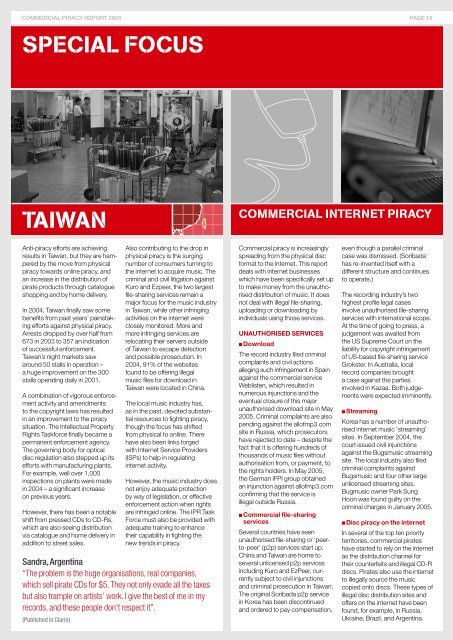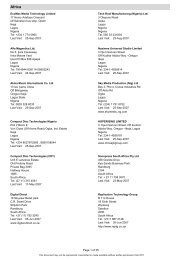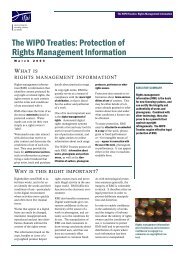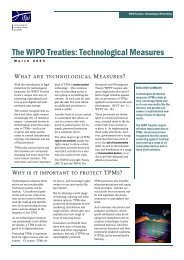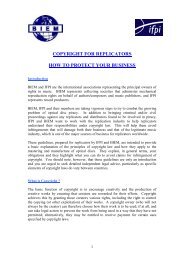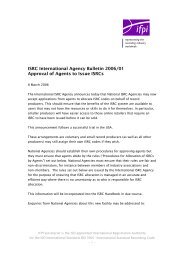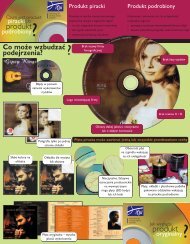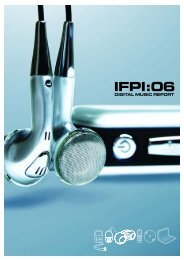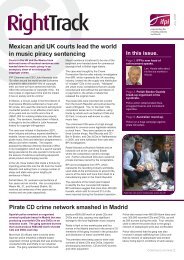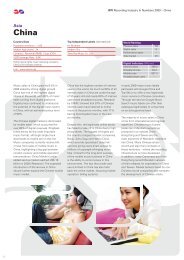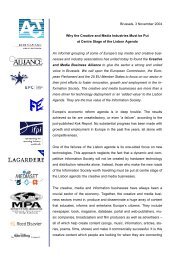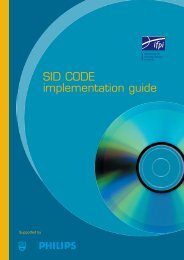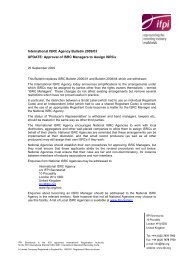*IFIC 20ppv3 - IFPI
*IFIC 20ppv3 - IFPI
*IFIC 20ppv3 - IFPI
Create successful ePaper yourself
Turn your PDF publications into a flip-book with our unique Google optimized e-Paper software.
COMMERCIAL PIRACY REPORT 2005 PAGE 16<br />
SPECIAL FOCUS<br />
TAIWAN<br />
COMMERCIAL INTERNET PIRACY<br />
Anti-piracy efforts are achieving<br />
results in Taiwan, but they are hampered<br />
by the move from physical<br />
piracy towards online piracy, and<br />
an increase in the distribution of<br />
pirate products through catalogue<br />
shopping and by home delivery.<br />
In 2004, Taiwan finally saw some<br />
benefits from past years’ painstaking<br />
efforts against physical piracy.<br />
Arrests dropped by over half from<br />
673 in 2003 to 357 an indication<br />
of successful enforcement.<br />
Taiwan’s night markets saw<br />
around 50 stalls in operation –<br />
a huge improvement on the 300<br />
stalls operating daily in 2001.<br />
A combination of vigorous enforcement<br />
activity and amendments<br />
to the copyright laws has resulted<br />
in an improvement to the piracy<br />
situation. The Intellectual Property<br />
Rights Taskforce finally became a<br />
permanent enforcement agency.<br />
The governing body for optical<br />
disc regulation also stepped up its<br />
efforts with manufacturing plants.<br />
For example, well over 1,000<br />
inspections on plants were made<br />
in 2004 – a significant increase<br />
on previous years.<br />
However, there has been a notable<br />
shift from pressed CDs to CD-Rs,<br />
which are also seeing distribution<br />
via catalogue and home delivery in<br />
addition to street sales.<br />
Also contributing to the drop in<br />
physical piracy is the surging<br />
number of consumers turning to<br />
the internet to acquire music. The<br />
criminal and civil litigation against<br />
Kuro and Ezpeer, the two largest<br />
file-sharing services remain a<br />
major focus for the music industry<br />
in Taiwan, while other infringing<br />
activities on the internet were<br />
closely monitored. More and<br />
more infringing services are<br />
relocating their servers outside<br />
of Taiwan to escape detection<br />
and possible prosecution. In<br />
2004, 91% of the websites<br />
found to be offering illegal<br />
music files for download in<br />
Taiwan were located in China.<br />
The local music industry has,<br />
as in the past, devoted substantial<br />
resources to fighting piracy,<br />
though the focus has shifted<br />
from physical to online. There<br />
have also been links forged<br />
with Internet Service Providers<br />
(ISPs) to help in regulating<br />
internet activity.<br />
However, the music industry does<br />
not enjoy adequate protection<br />
by way of legislation, or effective<br />
enforcement action when rights<br />
are infringed online. The IPR Task<br />
Force must also be provided with<br />
adequate training to enhance<br />
their capability in fighting the<br />
new trends in piracy.<br />
Sandra,Argentina<br />
“The problem is the huge organisations, real companies,<br />
which sell pirate CDs for $5.They not only evade all the taxes<br />
but also trample on artists’ work. I give the best of me in my<br />
records, and these people don't respect it”.<br />
(Published in Clarín)<br />
Commercial piracy is increasingly<br />
spreading from the physical disc<br />
format to the internet. This report<br />
deals with internet businesses<br />
which have been specifically set up<br />
to make money from the unauthorised<br />
distribution of music. It does<br />
not deal with illegal file-sharing,<br />
uploading or downloading by<br />
individuals using those services.<br />
UNAUTHORISED SERVICES<br />
■ Download<br />
The record industry filed criminal<br />
complaints and civil actions<br />
alleging such infringement in Spain<br />
against the commercial service<br />
Weblisten, which resulted in<br />
numerous injunctions and the<br />
eventual closure of this major<br />
unauthorised download site in May<br />
2005. Criminal complaints are also<br />
pending against the allofmp3.com<br />
site in Russia, which prosecutors<br />
have rejected to date – despite the<br />
fact that it is offering hundreds of<br />
thousands of music files without<br />
authorisation from, or payment, to<br />
the rights holders. In May 2005,<br />
the German <strong>IFPI</strong> group obtained<br />
an injunction against allofmp3.com<br />
confirming that the service is<br />
illegal outside Russia.<br />
■ Commercial file-sharing<br />
services<br />
Several countries have seen<br />
unauthorised file-sharing or ‘peerto-peer’<br />
(p2p) services start up.<br />
China and Taiwan are home to<br />
several unlicensed p2p services<br />
including Kuro and EzPeer, currently<br />
subject to civil injunctions<br />
and criminal prosecution in Taiwan.<br />
The original Soribada p2p service<br />
in Korea has been discontinued<br />
and ordered to pay compensation,<br />
even though a parallel criminal<br />
case was dismissed. (Soribada<br />
has re-invented itself with a<br />
different structure and continues<br />
to operate.)<br />
The recording industry’s two<br />
highest profile legal cases<br />
involve unauthorised file-sharing<br />
services with international scope.<br />
At the time of going to press, a<br />
judgement was awaited from<br />
the US Supreme Court on the<br />
liability for copyright infringement<br />
of US-based file-sharing service<br />
Grokster. In Australia, local<br />
record companies brought<br />
a case against the parties<br />
involved in Kazaa. Both judgements<br />
were expected imminently.<br />
■ Streaming<br />
Korea has a number of unauthorised<br />
internet music ‘streaming’<br />
sites. In September 2004, the<br />
court issued civil injunctions<br />
against the Bugsmusic streaming<br />
site. The local industry also filed<br />
criminal complaints against<br />
Bugsmusic and four other large<br />
unlicensed streaming sites.<br />
Bugmusic owner Park Sung<br />
Hoon was found guilty on the<br />
criminal charges in January 2005.<br />
■ Disc piracy on the internet<br />
In several of the top ten priority<br />
territories, commercial pirates<br />
have started to rely on the internet<br />
as the distribution channel for<br />
their counterfeits and illegal CD-R<br />
discs. Pirates also use the internet<br />
to illegally source the music<br />
copied onto discs. These types of<br />
illegal disc distribution sites and<br />
offers on the internet have been<br />
found, for example, in Russia,<br />
Ukraine, Brazil, and Argentina.


